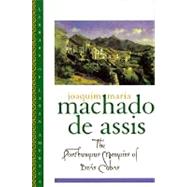The Posthumous Memoirs of Brás Cubas
, by Machado de Assis, Joaquim Maria; Rabassa, Gregory; de Sa Rego, Enylton; Pinheiro Passos, Gilberto- ISBN: 9780195101690 | 0195101693
- Cover: Hardcover
- Copyright: 11/6/1997
The Posthumous Memoirs of Bras Cubas Joachim Machado de Assis Translatedby Gregory Rabassa Edited by Enylton de Sa Rego and Gilberto Pinheiro Passos"Be aware that frankness is the prime virtue of a dead man," writes theextraordinary narrator of The Posthumous Memoirs of Bras Cubas. "The gaze ofpublic opinion, that sharp and judgmental gaze, loses its virtue the moment wetread the territory of death. I'm not saying that it doesn't reach here andexamine and judge us, but we don't care about the examination or the judgment.My dear living gentlemen and ladies, there's nothing as incommensurable as thedisdain of the deceased." Indeed, writing his memoirs from the other world givesBras Cubas a certain freedom from both social and literary conventions. Andwhile he may be dead, he is surely one of the liveliest characters in fiction, aproduct of one of the most remarkable imaginations in all of literature,Brazil's greatest novelist of the nineteenth century, Joaquim Maria Machado deAssis.Famous in his lifetime and still revered throughout Latin America,Machado de Assis has remained little known in the English-speaking world. Herepresents an important antecedent for the experimental fictions of Borges,Cortazar, Fuentes, and others. In this wildly inventive book, de Assis is, infact, much closer to such postmodern masters as Calvino, Kundera, and Marquezthan to the conventions of the nineteenth century realist and romantic novel,which the narrator continually and hilariously mocks. Irrepressiblywhimsical, irreverent, chatty, and charmingly self-absorbed, Bras Cubas isforever intruding into his narrative, questioning, lecturing, and elbowing thereader, commenting on his writing and its highly unusual style--"this book andmy style are like drunkards, they stagger left and right, they walk and stop,mumble, yell, cackle, shake their fists at the sky, stumble, andfall"--congratulating himself on particular chapters, wondering whether to cutothers out, and interrupting his life story with all manner of digressions, froma philosophical discourse on the purpose of the nose to a visionary ride on theback of a rhinoceros to find the origin of the centuries. Along the way we'retreated to a marvelous cast of characters, including the outlandish philosopherQuincas Borcas, who asserts that "asceticism is the perfection of human idiocy,"and Virgilia, the beautiful married woman with whom Bras Cubas carries on apassionate and not-so-secret love affair. By turns flippant and profound, ThePosthumous Memoirs of Bras Cubas is the story of an unheroic man withhalf-hearted political ambitions, a harebrained idea for curing the world ofmelancholy, and a thousand quixotic theories unleashed from beyond the grave. Itis a novel that has influenced generations of Latin American writers but remainsrefreshingly and unforgettably unlike anything written before or after it.Newly translated by Gregory Rabassa and superbly edited by Enylton de SaRego and Bilberto Pinheiro Passos, who provide an insightful introduction andafterword, this editon inaugurates Oxford's Library of Latin America series, andbrings to English-speaking readers a literary delight of the highestorder.






